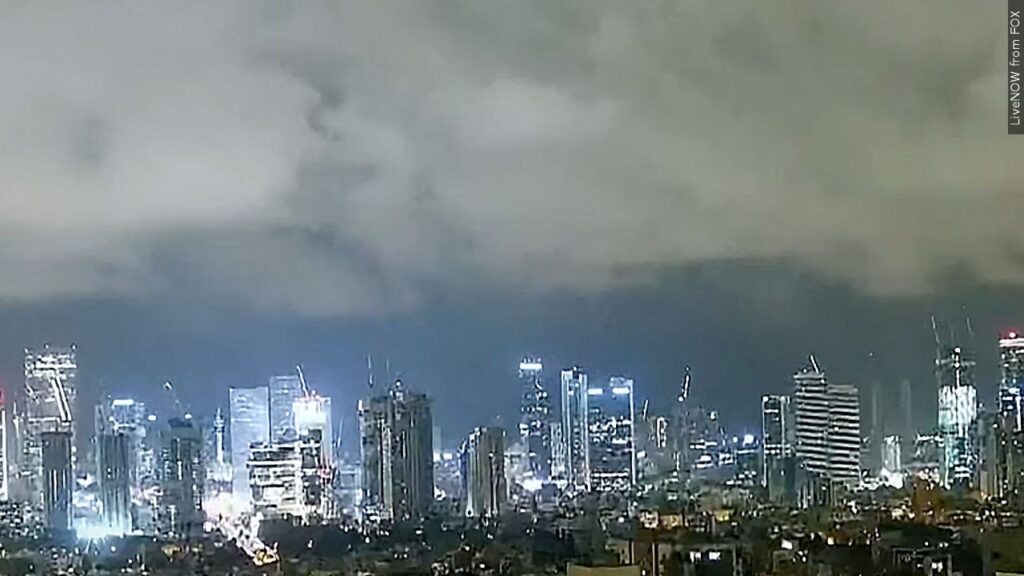The Islamic Republic of Iran sent shock waves across the world when it sent a retaliatory barrage of missiles and drones into the Zionist State of Israel. At Final Call presstime, leaders were holding emergency meetings of the UN Security Council and the G7 nations—the United States, Japan, the United Kingdom, France, Germany, Canada, Italy, and the European Union to work out a response.

At the Security Council on April 14, UN Secretary General Antonio Guterres called for “maximum restraint” in the crisis. The UN chief said he is deeply alarmed about the very real danger of a devastating region-wide escalation.
“I urge all parties to exercise maximum restraint to avoid any action that could lead to major military confrontations on multiple fronts in the Middle East,” said the Secretary-General, adding, “I have repeatedly stressed that neither the region nor the world can afford another war.”
The April 14 teleconference was pulled together by U.S. President Joe Biden, who spoke virtually with the leaders to condemn Iran’s unprecedented move and reaffirm the G7’s commitment to Israel. The meeting was convened “to coordinate a united diplomatic response to the attack, said a White House statement.
“I think we have to wait and see what the Israelis decide to do,” National Security Spokesperson John Kirby told the media.
“President Biden, since the beginning of this conflict, has worked very hard to keep this from becoming a broader regional war, to keep the tensions from escalating,” added Mr. Kirby.
But for some observers and analysts, the G-7 leaders condemning Iran in one breath, while feeling for Israel in the same breath is duplicitous, particularly led by Washington, the leading provider to Israel of military ware and financial aid.

For Iran, it did what it had threatened it would do, responding to a brash act of Israeli aggression on its sovereignty. Israeli air strikes targeted and destroyed the Iranian Consulate in Damascus, Syria, and killed several top military leaders on April 1. This must be kept upfront said observers and analysts on the situation.
“Israel engaged in an act of war against Iran, it violated international law by attacking their embassy/compound,” said Wilmer Leon, political scientist and commentator. “That space was sovereign Iranian space in Syria,” he told The Final Call, pointing out, “Israel attacking that facility was an act of war.”
On April 13, Iran fired more than 330 drones and missiles into Israel in a military assault that was broadly anticipated by Israel and its Western cohorts in the United States and the United Kingdom. The countries were on red alert since Israel’s aggression. In a statement, Iran’s Islamic Revolution Guards Corps (IRGC) announced it had embarked on “Operation True Promise.”
The consulate bombing was a provocation exceeding the limits of international norms. Days earlier, Leader of the Islamic Revolution, Ayatollah Seyyed Ali Khamenei said, Israel “must be punished and will be punished” for the deadly strike.
In April 10 remarks during an Eid message, marking the end of the Muslim Holy Month of Ramadan, he called the consulate attack a serious miscalculation by the Zionist regime.
“The consulate and diplomatic missions in any country are considered to be the territory of that country,” said Ayatollah Khamenei. “When they attack our consulate, it means they have attacked our soil,” he added.
According to an April 13 statement from Iran’s UN mission, Tehran said its retaliatory attack “can be deemed concluded,” saying the missile strikes accomplished what they intended. However, they are prepared to inflict a worse response if required.
Press TV exclusive: All hypersonic missiles used in Iran's strikes against Israel hit targetshttps://t.co/t0c68ub41S
— Press TV 🔻 (@PressTV) April 15, 2024
“Should the Israeli regime make another mistake, Iran’s response will be considerably more severe,” the statement said.
At press time, Israeli media reported no fatalities from Iran’s attack, and that a seven-year-old girl was seriously injured. The girl, Amina al-Hassouni from the Bedouin village of al-Fur’ah, was wounded when shrapnel hit her home.
According to Israel Defense Forces (IDF) spokesman Daniel Hagari, most of the drones were intercepted except a few, causing “minor damages to a military base” in southern Israel.
Despite the double-speak about not escalating into a regional or multi-national conflict, Britain and America were swift to note it was their militaries that intercepted the Iranian missiles.
Mr. Biden said, “to support the defense of Israel,” he directed the U.S. military to move aircraft and ballistic missile defense destroyers to the region over the course of the days before Iran’s response. He attributed the heightened militarization backing Israel to downing “nearly all” of the incoming drones and missiles.
In addition, Britain’s Royal Air Force entered the fray to back Israel against Iran.
PressTV.ir quoted Iran’s Defense Minister Brigadier General Mohammad Reza Ashtiani, warning: “Whatever country that could open its soil or airspace to Israel for a [potential] attack on Iran, will receive our decisive response.”
The move came amid fears of a wider war igniting in the Middle East, triggered by Israel’s war on Palestinians raging since October 2023, under the pretext of a war to eradicate the Palestinian resistance group Hamas.
Tehran’s attack was the single largest drone attack ever carried out by any country, and it was the first time Iran directly attacked Israel after almost a half-century of being archenemies. Some question why now?
Iran had not responded directly despite Israel’s long sordid record of provocations, including targeted assassinations of nuclear scientists and military leaders. The Iranian streets were growing weary of only verbal banter and wanted a response this time.
When word went out about the strikes, Iranians celebrated in the streets of Tehran and as far away as London. Israel’s aggression on the consulate and killing of the generals sparked an “enough is enough” posture of Iran.
Mr. Leon said, Iran doesn’t want war because he said considering it possesses more powerful missiles than what they sent. Mr. Leon attributed the move to Iranian domestic politics and pressure. “I think there are a couple of factors here. One is domestic politics; their people are saying to the President (Ebrahim) Raisi, what are you gonna do?”
said Mr. Leon. “They kill (Qassem) Soleimani; what are you gonna do? that was part of it,” added Mr. Leon, speaking of the Iranian high-ranking military officer assassinated in 2020 in a U.S. drone strike.
“I think there was also a part … understanding if they didn’t do something, Israel would just see that as the green light to do whatever else it wants to do,” he added. The Final Call will continue to monitor this story as it develops.













